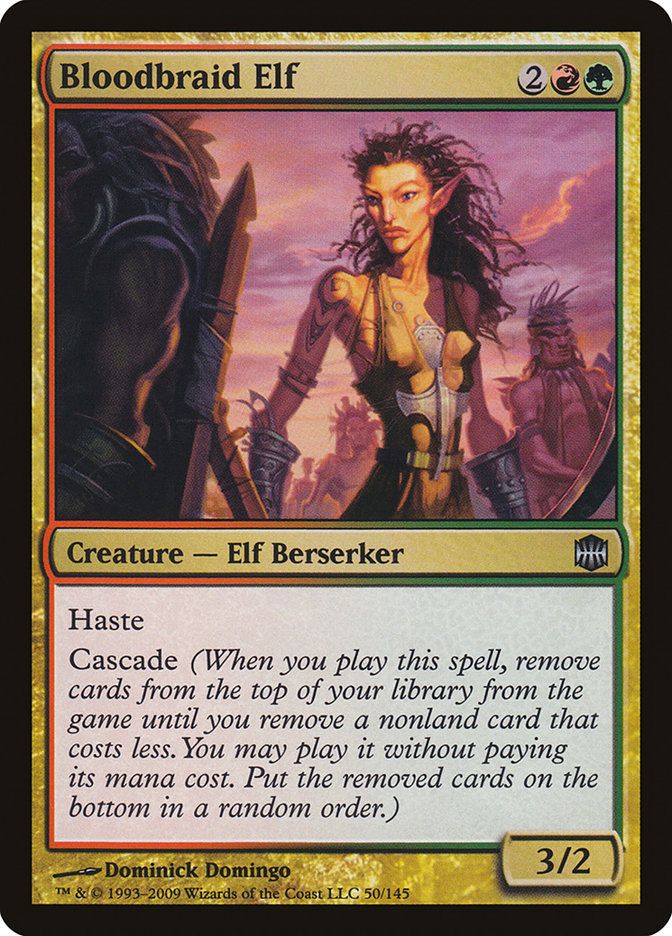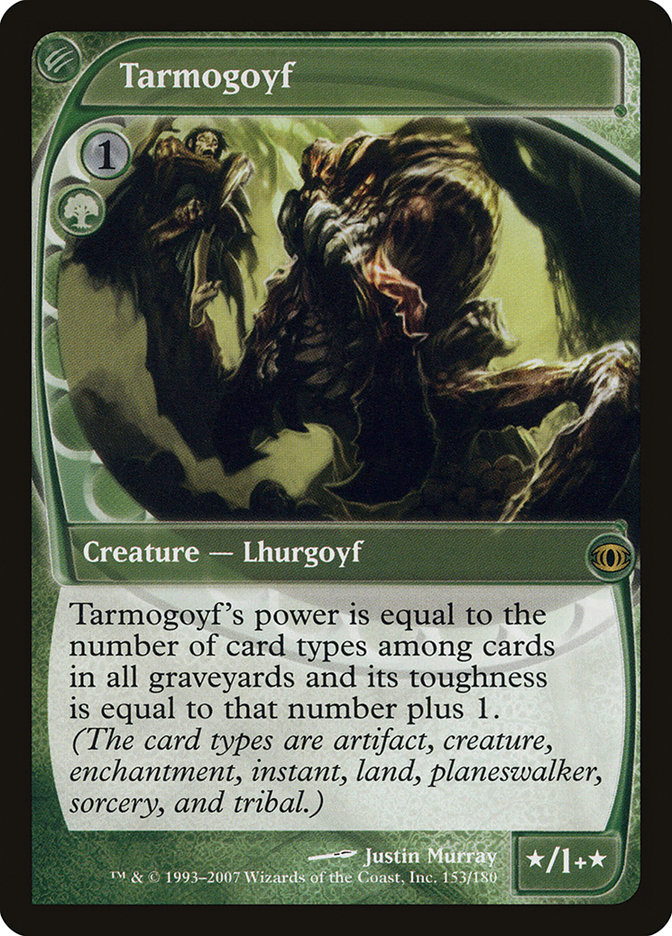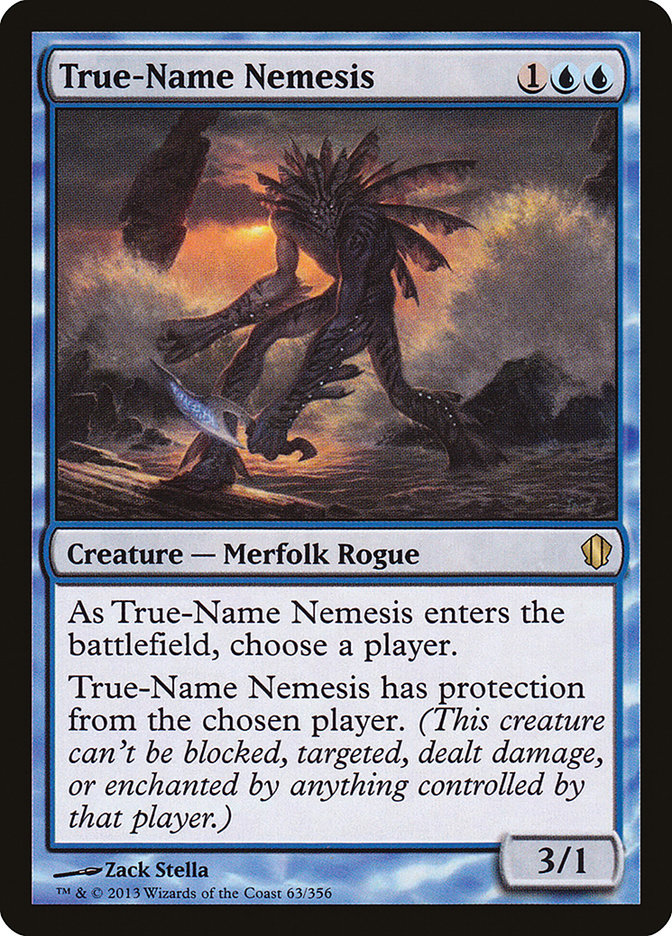It feels like it’s been forever since I’ve gotten to sit down and write an article! Between all the traveling I’ve been doing and my spot on SCG Select being moved to Friday, there was a short in lull in my articles going up. Thankfully I’m now settled into my new Friday home and should be back to producing a new article on a weekly basis. Speaking of my recent travels, I’d like to take today’s article to recap a few of the interesting things that happened to me at Grand Prix Washington DC. Although I finished just outside of the money, it was one of the more fun and interesting tournaments I’ve played in a while.
Greatness At Any Cost
I might as well start things off with the most insane thing that’s happened to me in a while.
DC was a Legacy GP, which means I was playing the only deck I’ve played since picking up Legacy a few months ago: Shardless BUG. Coming off of three byes and a round 4 win, I began playing round 5 against a rather nice fellow I hadn’t seen before. After the first few turns of game 1, I noticed two things about my opponent—he was playing Punishing Jund and played extremely slowly and meticulously.
Now, as any Shardless BUG player knows, Punishing Jund is an extremely bad matchup. They have a lot of the same threats and disruption as you but back it with the Punishing Fire / Grove of the Burnwillows combo that kills pretty much everything in your deck outside of Tarmogoyf.
As for the meticulous play, I don’t mean it as anything negative. He certainly was never trying to stall the game out; he just played in a way where he announced everything from entering his upkeep to asking if his spells resolved even if I had no cards in my hand. It was annoying at worst but completely understandable.
I managed to win game 1 by the skin of my teeth just as he started to set fire to my threats. Game 2 went in a much more typical fashion, and by that I mean I got destroyed. It was in game 3 where things got a little crazy. The beginning turns of the game were very back and forth and involved him drawing a few extra cards off of a Dark Confidant while I was able to pressure his life total. Things took a turn for the worse when he played a second Confidant and fired off a Hymn to Tourach while I was tapped out, hitting the two Brainstorms from my two land/two Brainstorm hand. A couple poor draws later and I was close to being buried.
On my last turn of the game, I drew another land and played it as the last card from my hand. My board now consisted of five lands and nothing else. My opponent’s board had two Dark Confidants, a Liliana of the Veil on one loyalty, a tapped Deathrite Shaman, and a Tarmogoyf. Between the creatures he had in play, the Bloodbraid Elf I knew he had in hand, and the Punishing Fire engine he had going, I was more than dead on his turn. So what was my one hope? Well, he was on six life with two Dark Confidants in play. Even if he used Deathrite to gain life before his Confidant triggers, I could still luck out and have him hit two more Bloodbraid Elfs to finish him off.
As I passed the turn, he looked at me a little nervously and asked, “Can I resolve my Confidant triggers individually? Can I do things in between the two?” I of course told him that he could and watched as he untapped his lands and announced his two triggers.
He reached for his deck and flipped over the top card:
At this point, my heart was beating very fast. and my mind was racing with all sorts of speculations. Was I about to get savagely lucky and steal the game out from under my opponent? What were the odds that the next card was an Elf? Does Punishing Jund even play more than two Bloodbraids?!
What happened next went so fast it was basically a blur. My opponent who had been playing the match so incredibly carefully quickly reached for his deck and windmill slammed a card off the top. It’s a good thing he went so fast because if he had been going at his normal pace I probably would have gasped and stopped him out of pure shock. He moved his hand off the card to reveal none other than:
My heart skipped a beat. My opponent, seemingly relieved, tapped his Deathrite Shaman and announced that he would be removing my Shardless Agent to gain two life. Unfortunately for him, once the card from Dark Confidant is revealed the life is immediately lost, and it is too late to respond. A judge call and an appeal to the head judge later, I found myself walking around the convention center in a daze sitting at an undefeated record.
Wow. Even just thinking back on it now gives me chills. It’s been a while since I’ve gotten so absurdly fortunate to win I match I had no business winning. Although my opponent was extremely upset at the time, I can safely say he is never going to make that error again. Apart from showing off how lucky I got, there are a few things to take away from this situation.
Most importantly, never concede a game unless your life total is at zero or there is something else directly causing you to lose the game. I’m not even talking about scenarios as fringe as your opponent making a critical mistake to let you win a game you shouldn’t, although that does happen on occasion. Way too often I see people conceding games just because they are in a very unfavorable position and have to get extremely lucky or have their opponent draw five land in a row for them to even have a chance to crawl back into the game. Sure, maybe you will only win one out of twenty games from this position, but if you concede all twenty prematurely, you throw away major percentage points to actually Top 8 a tournament.
Secondly, make sure to familiarize yourself with all the interactions in your deck before entering a big tournament. Legacy is an extremely complex format, and while it might be challenging to know every interaction in the format, you should at least know what your own deck is capable of. The alternative is learning the hard way like my opponent.
I’d also like to thank my friends who were watching the match on how they handled the situation. My opponent was very unhappy after his mistake, and I could only imagine how much worse it would have been for him if they had started flipping out right in his face. They had the composure to wait for him to leave before patting me on the back and calling me the luckiest person they’d ever seen. Etiquette at a tournament is very important to me, and I’m proud to say my friends and I all possess it.
Cheatyface
Tournament etiquette brings me to my next anecdote. This one happened in one of the later rounds of day 2. I wasn’t in Top 8 contention at this point, but a Top 32 or 64 finish was still doable with a few wins.
My opponent was playing RUG Delver and had fallen very far behind in game 3. I managed to fight through the early mana-denial stage of the game, kill his threats, and stick a few of my own. To seal the deal, I played a Liliana of the Veil and used it to make him sacrifice his last remaining creature. On my following turn, I used Liliana’s +1 ability. My opponent jumped down my throat faster than I would have thought possible.
Him: “You already used Liliana this turn! What do you think you’re doing? I’m calling a judge!”
Me: “Whoa, easy dude. I haven’t used her this turn. I made you sacrifice last turn.”
Him: “You’re wrong!”
At this point, I went on to explain the exact game state for the last two turns and how there was no possible way for my Liliana to be on one loyalty and unused this turn. He grumpily said, “Fine,” scooped up his cards, and left.
There are a few things I found very wrong about this situation. First off was just how aggressive and accusatory my opponent was. It made him seem very desperate to catch me doing something wrong and get a win from it. It also made him seem generally mean and unenjoyable to play against. I’ve been in situations like this many times from the other side and will always say something along the lines of “hey, didn’t you already use Liliana this turn?” I like to think that the average Magic player isn’t a cheater and isn’t trying to pull a fast one on me. In almost all of these cases, I’ll politely talk the situation over with my opponent, and we’ll come to a resolution without any bad feelings involved.
One of the biggest differences I notice between pro players and novice players is how they handle certain situations. I had multiple opponents roll their eyes and groan obnoxiously when I cascaded into Ancestral Vision—even when I set it up with Brainstorm! I also had a couple of RUG Delver opponents topdeck a Lightning Bolt on the last possible turn to kill me. You know what I did? I shuffled up and got mentally prepared for the next game.
Being a strong player doesn’t just mean you make the correct plays all the time. How you carry yourself is also important.
False-Name Nemesis
Let’s close things out with a look at the new scourge of Legacy: True-Name Nemesis.
Going into the Grand Prix, there was a lot of talk about just how popular this little Merfolk was going to be. I knew that a lot of people thought Sneak and Show was going to be a very popular deck, and True-Name is at its worst against combo. As it turns out, the tournament did a very good job of showing the card off since nine copies made it into the Top 8, three of which were in Owen Turtenwald winning deck. Now that the results are in, I keep hearing people go crazy about just how good this card is going to be.
I gotta tell you, I don’t think the card is the real deal. I went into the tournament without making any changes to my Shardless list in terms of dealing with True-Name Nemesis. Although I played against the card multiple times, I only lost to it in one game out of an Esper Deathblade player’s sideboard when I wasn’t expecting him to play it.
We already know a three-mana 3/1 is bad against a combo deck, so that just leaves the “fair” decks for it to beat up on. From the Shardless BUG perspective, I say bring it on. I’ve already got Thoughtseize, Force of Will, Liliana of the Veil, Golgari Charm, and Toxic Deluge to deal with it, and that’s without devoting any extra slots towards it.
I’m aware other fair decks aren’t so naturally equipped to deal with the Nemesis, but I feel like if the card actually becomes prominent and deckbuilders put any effort into making sure they have outs to the card in their 75, it’s going to end up falling out of favor quickly.
I’m not saying to go out and quickly sell every True-Name Nemesis you own, but I definitely recommend being wary about shoving it into any aggressive deck playing Islands. Finding the right spots to put True-Name into your deck is going to be the real skill involved with playing the card.
This weekend I’m off to the cold white north with some good friends to play in Grand Prix Toronto. I can only imagine the stories that are going to come about this time around, and I hope one of them involves me hoisting my second Grand Prix trophy.
Happy Thanksgiving everyone!



